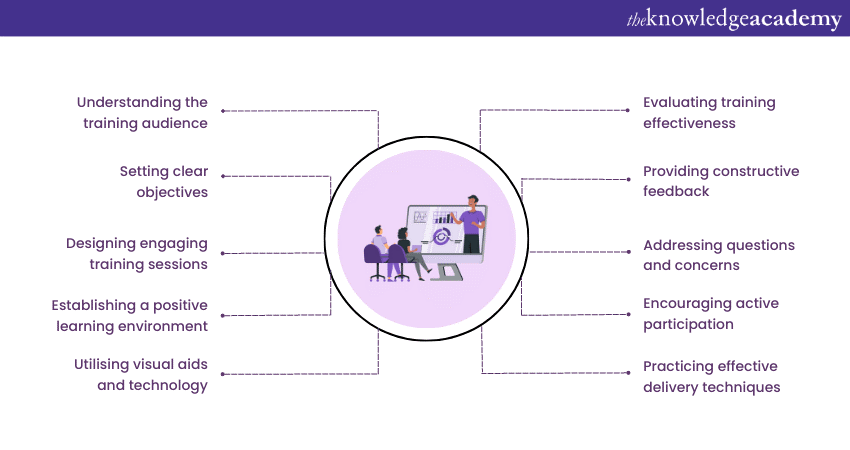We may not have the course you’re looking for. If you enquire or give us a call on +45 89870423 and speak to our training experts, we may still be able to help with your training requirements.
We ensure quality, budget-alignment, and timely delivery by our expert instructors.

Do you possess a passion for sharing knowledge, empowering others, and making a positive impact on their lives? If yes, then becoming a Trainer might be the perfect path for you. However, being an effective Trainer goes beyond possessing subject expertise. It requires a set of Train the Trainer Best Practices that engage, inspire, and empower learners.
Embracing these Train the Trainer Best Practices can enhance your abilities as a Trainer. They can also create meaningful and transformative experiences for your trainees. So, if you wish to embark on a journey of growth and learning as a Trainer, it’s time to understand these practices now.
Read this blog to learn about Train the Trainer Best Practices. Also, delve into the essential techniques that can elevate your training sessions to new heights.
Table of Contents
1) Understanding the Role of a Trainer
2) Train the Trainer Best Practices
a) Understanding the training audience
b) Setting clear objectives
c) Designing engaging training sessions
d) Establishing a positive learning environment
e) Utilising visual aids and technology
3) Conclusion
Understanding the Role of a Trainer
In the dynamic world of professional development, Trainers play a pivotal role in equipping individuals with the knowledge and skills they need to excel in their respective fields. A Trainer is more than just a dispenser of information; they are facilitators of learning, mentors, and guides on the journey to personal and professional growth.
At its core, the role of a Trainer involves creating and delivering engaging and interactive training sessions catering to the unique needs of their audience. This requires a diverse skill set. Moreover, Trainers must be approachable and open-minded, fostering an inclusive and positive learning environment.
In addition to designing and delivering training content, Trainers act as observers, gauging participants’ progress and adjusting their approach accordingly. They should be able to identify knowledge gaps and effectively address learners’ questions and concerns.
The role of a Trainer is both challenging and rewarding. It requires passion, dedication and a genuine commitment to empowering others to reach their full potential. By embracing their responsibilities with enthusiasm, Trainers become catalysts for growth. They can change the lives of those they train.
Master the art of training with our comprehensive Train The Trainer Course.
Train the Trainer Best Practices
Train the Trainer, a vital aspect of professional development, focuses on equipping trainers with the necessary skills and knowledge to deliver impactful training sessions effectively, thereby enhancing their Train the Trainer Skills.
To ensure successful outcomes and foster a positive learning environment, various best practices should be followed. But what are those practices? Let’s explore some of the key Train the Trainer Best practices in detail:

1) Understanding the training audience
One of the foundational best practices of Train the Trainer approach is understanding the training audience. Trainers must recognise the diverse backgrounds, learning styles, and knowledge levels of participants. Conducting a thorough needs analysis helps tailor training content to meet the specific needs of their audience, ensuring maximum engagement and relevance.
2) Setting clear objectives
Before embarking on any training session, Trainers should set clear and achievable objectives. These objectives act as guiding principles for the entire training process and help participants understand what they will gain from the training. Well-defined goals keep the training focused and contribute to measurable outcomes.
3) Designing engaging training sessions
Trainers should design engaging and interactive training sessions to capture participants’ attention and maintain their interest. Utilising a mix of training methodologies, such as group discussions, role-plays, and hands-on activities, encourages active participation and enhances the learning experience.
4) Establishing a positive learning environment
Creating a positive and inclusive learning environment is essential for effective learning. Trainers should foster an atmosphere where participants feel comfortable sharing their thoughts and ideas. Encouraging open communication and respecting diverse opinions creates a safe space for learning and collaboration.
Unlock your training potential and master the best practices with our Train the Trainer Training.
5) Utilising visual aids and technology
Incorporating visual aids, such as slides, videos, and infographics, enhances the training's effectiveness. Visuals help reinforce key points, improve retention, and cater to different learning preferences. Additionally, integrating technology, such as online learning platforms or virtual reality, expands the training's accessibility and engagement.
6) Developing clear and concise training content
Trainers should strive to deliver content clearly and concisely. Avoiding jargon and using plain language enhances understanding, especially for participants with varying levels of expertise. Well-structured content ensures that information is presented logically and coherently.
7) Practicing effective delivery techniques
In Train the Trainer approach, the way Trainers deliver the content significantly impacts participants' learning experience. Engaging delivery techniques, such as Storytelling, real-life examples, and enthusiasm, capture participants' attention and make the training memorable. Maintaining eye contact, using appropriate body language, and varying tone and pace of speech further enhance communication.
8) Encouraging active participation
Actively involving participants throughout the training reinforces their learning and encourages retention. Trainers can employ various techniques, such as asking questions, conducting group activities, and seeking feedback, to keep participants engaged and invested in the training process.
9) Addressing questions and concerns
A best practice for Trainer the Trainer is to be approachable and open to questions and concerns from participants. Creating a supportive environment where participants feel comfortable seeking clarification fosters a culture of learning and reinforces the Trainer's role as a resource and mentor. The Role of a Mentor in this context involves not only providing answers but also encouraging critical thinking, offering guidance, and facilitating discussions that promote deeper understanding and skill development.
10) Providing constructive feedback
After each training session, Trainers should offer constructive feedback to participants. This feedback helps individuals understand their strengths and areas for improvement, enabling them to grow both personally and professionally.
11) Evaluating training effectiveness
To continuously improve training programs, Trainers should evaluate their effectiveness. Gathering participant feedback, conducting assessments, and analysing learning outcomes provide valuable insights for refining future training sessions.
12) Embracing continuous learning
Trainers must recognise that learning is an ongoing process. Staying updated with industry trends, new training methodologies, and best practices ensures that Trainers remain effective and deliver high-quality training experiences.
Conclusion
Embracing effective Train the Trainer Best Practices is vital for creating a successful and impactful learning experience. By understanding the needs of the training audience and setting clear objectives, trainers can tailor their sessions to meet specific requirements. This helps foster engagement and relevance and empowers participants to reach their full potential. Additionally, being aware of Train the Trainer Advantages and Disadvantages can further refine the training approach and maximize its effectiveness.
Excel as a Trainer by elevating your Coaching and Mentoring Skills. Join our Coaching And Mentoring Skills Training now!
Upcoming Business Skills Resources Batches & Dates
Date
 Train the Trainer
Train the Trainer
Fri 21st Feb 2025
Fri 28th Mar 2025
Fri 25th Apr 2025
Fri 20th Jun 2025
Fri 15th Aug 2025
Fri 17th Oct 2025
Fri 19th Dec 2025






 Top Rated Course
Top Rated Course



 If you wish to make any changes to your course, please
If you wish to make any changes to your course, please


